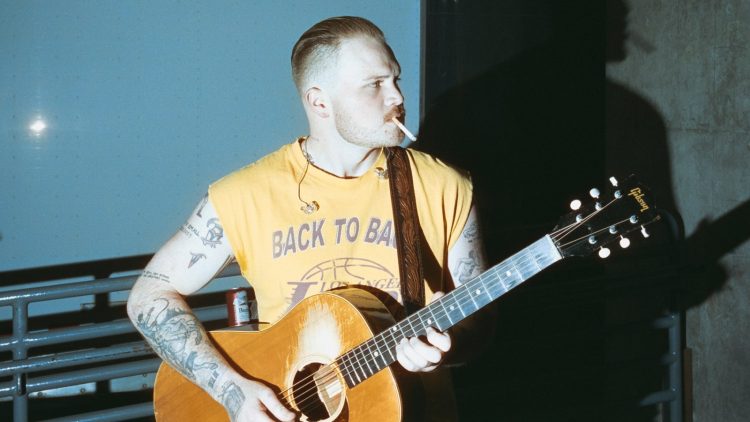In only 5 years, Zach Bryan has reworked from cult-roots street warrior (2020’s Elisabeth) to fast-rising country-adjacent renegade (2022’s American Heartbreak) to Quantity One hitmaker and voice-of-a-Gen-Z-generation storyteller (2023’s Zach Bryan).
The women and men (principally males) in his songs spend their twenties ingesting their approach by way of the alienating cities they’ve fled to from the small cities they’ve outgrown. They congregate in dive bars, break one another’s hearts, pound Excessive Lifes, pop Zyn, ponder God, place parlays, rediscover their rural accents, act youthful and really feel older than they are surely. The girls and boys in his America have such a rad time collectively. So why do they spend all their spare time remembering all the things?
The feat of The Nice American Bar Scene, Bryan’s fifth report, his magic trick, to cite certainly one of its many featured visitors, Bruce Springsteen, is to make it seem to be the life he sings about remains to be the one he’s residing. Since Bryan is such a preternaturally gifted songwriter, his new album’s premise is as convincing as it’s absurd: That America’s most iron-hot rock star spends his time not on airplanes and in hockey enviornment inexperienced rooms however traversing soiled dives with the boys, dropping cash to sketchy Philly bookies, and staying up for sunrises on buddy’s condo roofs.
The way in which Bryan wrestles with this distinction–between his newfound success and the homespun characters he writes about – and he wrestles with it fairly a bit – is by leaning on remembrances of a current stressed previous that’s by no means removed from his thoughts. “Give me 4 minutes and a bit of ‘little bit of time,” he sings on “Bass Boat,” one other tune about his favourite matter: reminiscence. “I’ll make them previous days an previous buddy of mine.”
These 19 songs really feel like a batch of previous pals largely due to Bryan’s different magical reward: his knack for absorbing and remodeling his many influences into one thing that feels uniquely his personal. He’s emerged because the foremost pop synthesizer of the previous decade in singer-songwriter, country-rock, indie-folk, and heartland rock, mixing his favourite Kings of Leon, Bon Iver, Turnpike Troubadours and Lumineers data into one thing that feels new to a youthful viewers.
Name it the Nice Americana Bar Jukebox: the best way Bryan deploys mournful trumpets, just like the Nationwide, to construct pressure (“Oak Island”), the traces of the Lumineers’ feel-good playbook when he sings “‘trigger I received you’” in falsetto (“Humorous Man”). All through the report, he channels his hero Tyler Childers’ knack for writing in his characters’ rural vernacular (see the album’s surplus of “they’s” and “I’s” and “you’se”). On “American Nights,” he twists bro-country signifiers (Fords, tan traces) right into a noir, Nebraska-esque story tinged with violence and PTSD. On “28,” he units a Jason Isbell-evoking refrain melody to the cello melodrama of the Avett Brothers. On the ballad “Memphis; the Blues,” he goes additional, recruiting songwriting hero and fellow Okie John Moreland, for a co-write and a second verse. When, just a few songs later, he enlists Springsteen himself for a duet, the music they commerce verses on (“Sandpaper’) is an homage to “I’m on Hearth.”
However a part of Bryan’s gorgeous industrial success could also be that amidst all this influence-peddling, his closest songwriting modern is Taylor Swift, whose sui generis worldbuilding Bryan nearly all the time pulls off for himself. Like Swift’s current work, he makes use of silence and area to show in any other case sparse data into stadium sing-alongs. And as a lyricist, he’s absorbed Swift’s knack for element (a worn-in baseball glove, a rusty door-hinge, a balled-up left fist).
The result’s writing that blends endearing Kerouac cosplay, Instagram poetry, and Proustian profundity, typically from one line to the following, like on the final verse of “The Approach Again”. “Pink Skies,” the album’s lead single (that includes Watchhouse, one other affect) is a masterclass in storytelling that deploys sparse imagery about grief and household to pack a novel’s value of emotional punch into 4 minutes. In a single picture, Bryan nails the flood of recollections and feelings his protagonist faces packing up a childhood house whereas grieving: “All of the inches..scraped on the door body/Everyone knows you tip toed as much as 4’1 again in ‘08,” he sings. Bryan is adept at letting scraps of dialogue do his narrative heavy-lifting, as he does on “The Approach Again,” the story of a mom and her wayward grownup son: “She all the time sat below the oak tree/Sayin’, ‘God I miss the previous me.’”
That Bryan’s newest could be even stronger if it had been 4 songs shorter is irrelevant. Among the many many strategies he’s absorbed from his pop contemporaries (Swift, Drake, Morgan Wallen, Dangerous Bunny, et. al) is the fashionable idea of the album as Annual Content material Dump. This one’s cheerfully grandiose title is, unsurprisingly, a bait and swap: These are unhappy songs, small in scope and measurement (none run previous 4 minutes). These are tales about alienated younger adults taking pictures the bull and buying and selling recollections over pool tables and entrance stoops to each fend off and feed a nostalgia they really feel crushed by earlier than hitting 30. On The Nice American Bar Scene, Bryan reveals his followers simply how a lot he relates: “I all the time felt like I’s in-between one thing,” he sings on “28.” “Like house and someplace far-off.”



